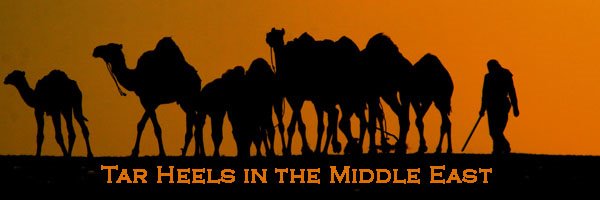As the throngs of loyal THT readers are well aware, I like to look at pictures, symbols, and signs – visual culture – and make sort of far flung inferences from them. You may laugh, but my advisor suggests this is the best way to become a real life Robert Langdon…
But all hopes of becoming a man who overcame albino assassins, millenia old conspiracies, and clunky prose to get Tom Hanks a mullet aside, upcoming municipal elections in Jordan have graciously provided some interesting material.
White banners with colorful calligraphy convey candidates’ information, stretching across chaotic roads that strike fear into the hearts of some observers.

Some of these banners contain a surprising amount of information. The details spicing up this Salti (unfortunately when I visited this time I wasn't told I would burn in hell) candidates’ banner include his nickname and phone number. (If you'd like more information about Abu Yasser, please call 077 776 7661)
In addition to banners, a number of posters have sprung up, covering walls, street lights, bus shelters, and, really, any available edifice.
Although they are certainly widespread, I’m a little disappointed with the images. They might even be more boring than Bashar al-Assad’s posters.
I suppose on the one hand the uniformity might be a good thing. It protects the integrity of the political poster, preventing its facebook-ization (Look where I’ve been! Look, I have my shirt off! Look, I’m upper middle class and I’m making a symbol with my hands that could be construed as a gang sign!).
More importantly, it ensures that people vote based on qualifications rather than photos. Although I’ll say this right now: I only vote for windsurfers.
The political posters have also exponentially increased the number of mustachioed man pictures I see everyday, which is always a good thing. Though facial hair seems to be a hindrance to attaining public office in the United States (apparently Benjamin Harrison was the last bearded president) , it is obligatory in Jordan.
That's not really true -- that would disenfranchise all those who can't grow facial hair, meaning women and myself.
At any rate, the Jordanian government is doing more than handing out fake mustaches to promote women in municipal government posts. Women - more than 500 of whom expressed their intention in candidacy - will occupy at least 20% of the country's municipal seats, according to Parliament's Municipalities Law which was passed earlier this year.
The Jordanian National Commision for Women (JNCW) is spearheading a campaign to publicize women's candidacies. In 2003, only 5 of 46 women running were elected, with the government appointing nearly one hundred to offset the shortcoming.
Some of the promotional material takes an approach to gender justice that might surprise some westerners. Pamphlets and posters carried slogans like “You (men) trusted women to raise your children, wouldn’t you trust them to serve your country?”, “Women want their position in society not yours (men)”, "women are working with you (men), not against you”. Rather than taking a confrontational approach calling for justice, this campaign makes its calls based on traditional gender roles.
This approach extends to some of the individual campaigns as well. Below, we see Sahar Hindawi's posters at left and right and an unidentified daring photographer in the center. Hindawi is a candidate for representing the Tila' al 'Ali region and her slogan is "Our house (baytna) requires action and not talking."
Correction: Hindawi's poster doesn't say "Our house requires action and not talking." It says, "Our environment requires action and not talking." Beeitna, not baytna. I'm a chowderhead. Not sure how much weight the argument still holds.

We see the use of "house" continue with Bushra Al-Razee Al-Z'abee's banner below, which bears the slogan: "Baytee wa baytik," my house and your house.

The use of "bayt" by both Hindawi and Al-Z'abee alludes to what some would call the traditional role of women - as the executor of hospitality in the domain of the home.
One might look at the slogans of these women or the JNCW as strategic maneuvers that employ the rhetoric of tradition to secure a non-traditional role in the male-dominated government.
But it might also be that these women - like many female office holders in the United States - don't see their traditional roles and governmental roles as necessarily dichotomous, seeing them instead as fluid extensions of their identity.
Recognizing the possible existence of these differing epistemologies is an essential point often missed by those observers worried about "oppressed women" over here.
Thanks for reading, folks.

1 comment:
the one thing i have to say iS:
stop hating on facebook. You know u love the upper class people doing weird gang signs.
Its the shizzle mizzle.
Post a Comment